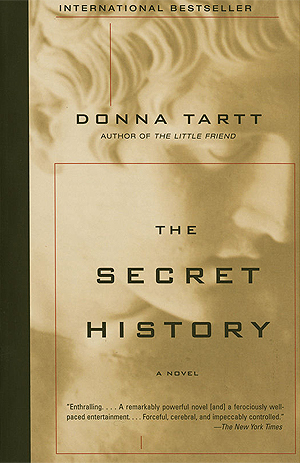Acton reviewed The Secret History by Donna Tartt
Review of 'The secret history' on 'Goodreads'
5 stars
Donna Tartt's debut 1992 novel, The Secret History, opens with a prologue that lets the reader know, straight away, that Bunny will be murdered by his closest friends, and that this story will be told in the first person by one of them.
I suppose at one time in my life I might have had any number of stories, but now there is no other. This is the only story I will ever be able to tell.
This is Richard Papen's story, and he starts out by telling us the truth about his rather boring and poor childhood in Northern California, which he quickly replaces for a much more satisfying--and fictional--life when he manages to acquire the financial aide he needs to attend an expensive, tiny college in Vermont, which is about as far away from his dreaded home as he can get. Once there, he discovers that one of his biggest academic interests, Greek, is taught by the intriguing Julian Morrow, who only takes on a handful of students, and his class is full. However, Richard once again manages to obtain what he wants, charming his way into this rarefied atmosphere. For Richard, this is a heady, almost dangerous feeling, since he knows that in many aspects, he will be an outsider in this tiny, close-knit group.
Julian Morrow's class is more than just a Greek class, however--it is an entire major. These six students, Charles and Camilla Macauley (twins), Francis Abernathy, Edmund "Bunny" Corcoran, Henry Winter, and Richard, take most of their classes with Julian (as they address him), as Classics majors. It is a very unusual situation for undergraduates and it is a decision that Richard has been warned against, but--he's simply too fascinated with the group to stay away. It is the type of academic experience he's longed for.
Actually, in the beginning, this group of students appear to be rich and insufferably snobby, and I felt stressed for poor work-study Richard. Slowly, incident by incident, we get to know these young people as they begin to let Richard into their fold. One of the most riveting parts of the novel is how there is always another layer in each character to be uncovered. Julian's students, as Richard discovers, aren't the perfect rich kids he's imagined. Actually, only Henry and Francis are rich. The twins do not have rosy finances, plus much worse problems, besides. And Bunny's circumstances are very odd and simply appalling.
It is not long after Richard joins the group that something very bizarre happens to Francis, Charles, Camilla, and Henry, who have been experimenting clandestinely with a Pagan ritual focused on worshiping Dionysus. The four of them want nothing more than to completely forget what happened that night and the horrible accident it caused, and are desparate to keep it a secret.
This incident is the catalyst for the rest of the plot and turns the lives of everyone in this little circle into a strange and wicked odessey. And, along the way, the reader cannot help but ponder such questions as, How would I react, if I knew (xyz) about a friend? What would I do with this knowledge? What should I do with this information, and could I stand to do it?
I'd like to be able to point to the part of this tale where it became very difficult to put down, but perhaps that's as hard as it would be for Richard Papen to decide at what point he was too involved with the other characters to put them down. The Secret History is an extraordinary psychological thriller and is also a reminder of youthful feelings, such as the wish that friendships and fun times could stay the same forever, that no one would have to grow up , move away, and face different responsibilities. A term break meant two months' separation, and felt like forever. The unique atmosphere Donna Tartt creates around Julian's class is such that it was difficult for me to surmise when this story was taking place. It was an excellent way of revealing how insulated and different these six young lives were.
This is a tragedy worthy of the worshippers of Dionysus, and a long one, at 523 pages, but the pages will turn themselves. I really should go out and purchase this book. The thought of returning it to the library is a bit--tragic.

